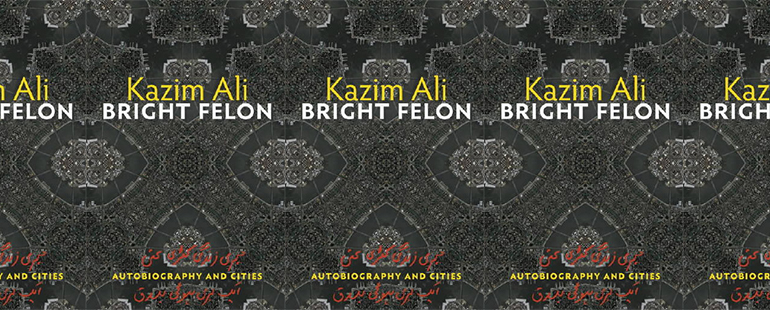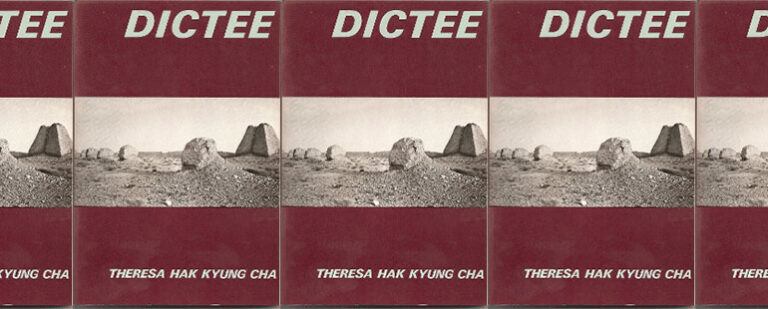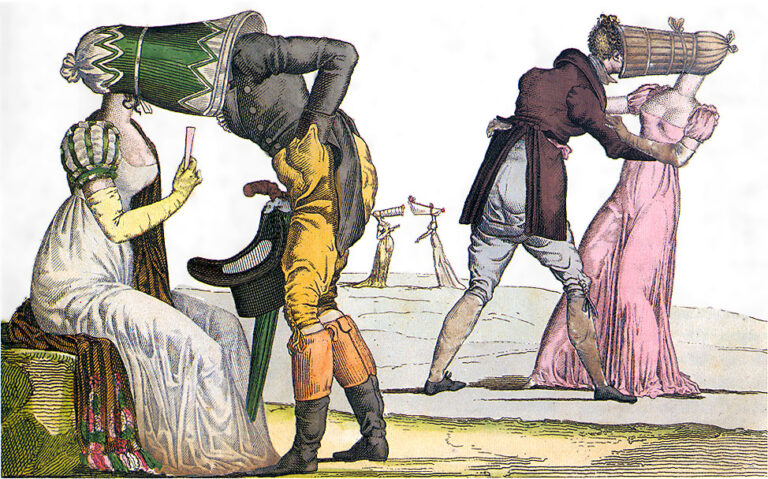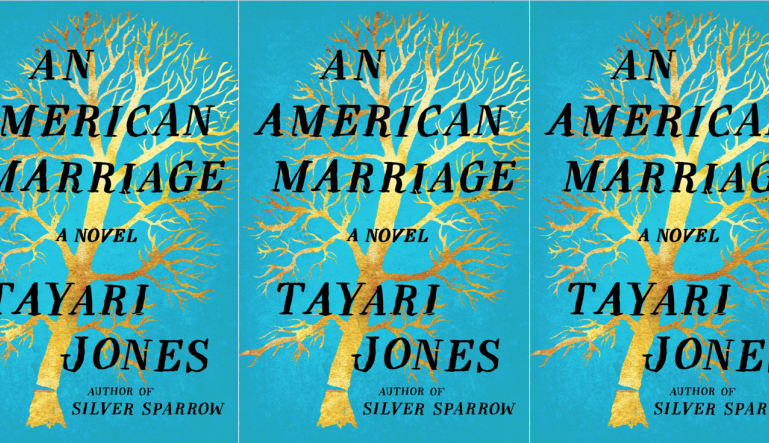The Fragmentary City of Bright Felon

Kazim Ali’s 2009 book Bright Felon: Autobiography and Cities is built like a city: fragmentary, recursive, and at once public and personal. Each of the book’s fifteen lyric essays is a travelogue titled with the name of a city the narrator moves through. Ali’s narrator is queer, full of “the feeling of hunger”—a seeker and traveler, he is searching for home in cities like Paris, Cairo, Rhinebeck, and New York City, and through the body itself; all the while, he is running from his queerness. Travel fragments the narrator’s experience and story—as a travelogue, the book is about the wanderer; it is deeply rooted in place, but not about place—shattering the idea that an autobiography should be told in complete sentences. Bright Felon serves as a pilgrimage toward “scripture or rupture,” the narrator repeatedly attempting to evade his own identity, never staying in one place long enough for his family back in Buffalo to start asking questions about when he’ll “settle down.”
As the narrator avoids making grand pronouncements about himself, or declarations about the totality of any particular city, however, this reading begins to break down—I should be wary of making grand pronouncements about he who notes, “What is my war? Not the one you think.” Queerness is only one of the narrator’s central questions; he also considers war, punishment, gentrification, environment, language, spirituality, and religion. Throughout, however, remains an interrogation of the relationship between identity and place, and the way that travel forces us to become aware of our fragmentation. The narrator travels to Europe, his faltering French fragmented; he steps through graveyards, art museums, and apartments, but always seems very much alone. The book, with its recursive, confessional, and fragmented city-like structure, evokes the sense of an independent journey to a big, unknown city where you are always with other people, but never unaware of the fact that you are traveling solo.
The way a city is layered creates density and juxtaposition, textures that can be mysterious and magical, poignant and profound; cities are experiments in human organization and beauty. Ali views cities as palimpsests replete with other resident writers and eras. “There is no such thing as ‘present’ moment, nor of ‘this city,’” he writes in a section set in Cairo. “The people I see walking down the street exactly resemble the figures in the papyrus paintings, in the carvings.” Ali’s narrator filters his experience in the world through the artists he encounters and the books he reads. Ancient artists, too, are points of connection that help him to make sense of the present. Further echoing a city’s multitudes, Ali places recursive through-lines and themes within individual cities and throughout the book. Actual cities repeat themselves due to formal planning and informal norms, and living in a city involves layering personal experiences and memories connected to the place. Going to the same library over and over or walking down the same street every day creates an intimacy between resident and city; similarly, repetition within a text can create intimacy between writer and reader. Many of Ali’s repetitive gestures and images are small and potent, such as a lost sheaf of poems that included an unsent letter to the narrator’s mother, pronouncing and mispronouncing one’s own name, the sensations of hunger and being full, investigating a desecrated graveyard, and murals the narrator and his former boyfriend painted on the walls of an apartment they once shared. Such repeated images have multiple meanings and points of connection within the larger constellation of cities of this book. A few of the sections take place in the same cities, but we realize eventually that none of the cities are relayed in the order the narrator visited them. And, he admits, “I’ve left other cities out.” This creates the effect of collage and curation, similar to how an actual city contains layers, how you can walk past an apartment building a hundred times without thinking about it until you meet someone who lives there.
The narrator admits near the end of the book that he is on the move in order to evade questions about his queerness. He seems to have never stayed in one place long, and the effect of this movement is peripatetic accumulation. On reflection, he realizes that all of this wandering was required to redefine for himself what paradise is and where it might be. “How I came to hear again in a baptism of my own loneliness,” he writes. Loneliness in these cities was the crucible for belonging. Traveling fragmented the narrator’s experience and ability to compose, but he needed to smash and fragment his connections in order to unearth the next chapters of his autobiography. Ali reflects this epiphany in his fragmented, randomized lines. They appear in graceful non-arrangement, like shuffled notecards or dry leaves on the ground. “At the end of my years living in the City I didn’t know how to make a sentence anymore. I had a deck of index cards I carried around in my back pocket. It was May,” Ali writes. “Cities are like my deck of cards, one line after another, one thing and then another disappearing,” he continues later. These cards represent Ali’s lyric segments—which appear as either short paragraphs or what my professor Campbell McGrath called “strophic poetry,” depending on whether you’re using the lingo of prose or poetics to describe this book. It feels as if these segments could be shuffled like humans in a subway car or vehicles on a freeway, placed at any point in the text.
Cities, of course, are places where fragmented people have long come to become free—become whole—because cities contain some social structures that do not rely on the historically anti-queer institution of family. There is also a tension between cities and the notion of paradise or utopia. Cities represent the best and worst of the human condition because they are, by definition, places where human interaction happens on every note of the scale. The narrator in Bright Felon is wandering in search of paradise but eventually realizes that the location of paradise depends on who’s asking. “Paradise lies beneath the feet of your mother” is Bright Felon’s first sentence, but when it recurs after all this wandering, Ali asks, “If paradise lies beneath the feet of my mother then how will I find my way inside unless she admits me.” And then, near the very end of the text, again, it’s fragmented, repurposed, revisited: “Will you find the paradise that lies.” In a way, the narrator has lost his parents on the journey to finding himself. In all the meanings of the word, he must fragment the sentence. “It was in leaving the house, leaving the family, deciding that my rules were different, my life itself was going to be different,” Ali writes in one of the fragments that most explicitly reflects upon his journey. The sentence remains incomplete because after leaving comes the vastness of everything else. To venture into public queer life may mean abandoning the private obligations of one’s first family.
The book’s full title, Bright Felon: Autobiography and Cities, indicates that these lyric essays are themselves cities. It is not Autobiography in Cities, though every single section is titled with the name of a place, so we are left to think that the autobiography must be layered upon the cities, that they are coupled. In creating lyric structures that mimic the shapes and movements of cities, Bright Felon reflects on the beauty of social contradiction and imperfection.


